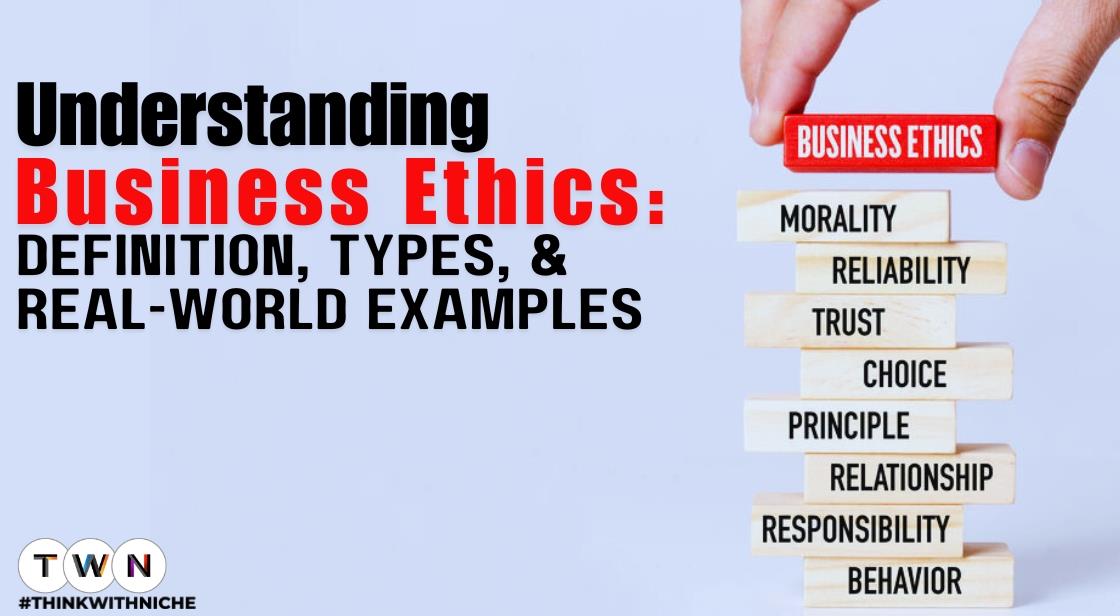Understanding Business Ethics: Definition, Types, and Real-World Examples

Blog Post
The business landscape is undergoing a seismic shift. Gone are the days where profit maximization reigned supreme. Today's consumers, investors, and employees hold companies accountable for their ethical conduct, demanding transparency, fairness, and a commitment to social responsibility.
This focus on Environmental, Social, and Governance (ESG) factors is not just a passing trend; it's a defining characteristic of successful businesses in the 21st century.
Data underscores this reality. A 2022 McKinsey & Company study revealed that companies with greater diversity in their leadership teams outperform their peers on profitability metrics by 19%.
Furthermore, a 2022 Morgan Stanley study found that sustainable funds attracted a record $59.8 billion in net inflows globally, highlighting the growing investor interest in environmentally conscious businesses. Operating ethically is no longer a peripheral concern; it's a fundamental ingredient for long-term success.
This article serves as a comprehensive guide to understanding business ethics. We'll explore the core principles that guide a company's conduct, delve into different ethical considerations, and showcase real-world examples of companies navigating complex dilemmas and demonstrating their commitment to doing good.
By equipping you with this knowledge, we aim to empower businesses to navigate the complexities of modern commerce, build trust with stakeholders, and achieve sustainable success.
Understanding Business Ethics: A Guidepost for Responsible and Sustainable Success in the 21st Century
In today's complex business world, navigating ethical dilemmas is crucial. Business ethics serve as a guiding force, ensuring companies operate with integrity and fairness. But what exactly are business ethics, and how do they play out in real-world scenarios?
This article delves into the core principles of business ethics, explores different types, and provides real-world examples to illustrate their practical application.
What Are Business Ethics?
Business ethics refer to the moral principles that guide a company's conduct and decision-making processes. It's about aligning business goals with ethical values, considering the impact on employees, customers, society, and the environment. Companies with strong business ethics prioritize fairness, honesty, transparency, and accountability in all their operations.
Business Ethics: The Compass Guiding Responsible and Sustainable Businesses
In today's rapidly evolving business landscape, navigating complex decisions ethically is no longer a nicety; it's a necessity. Business ethics serve as the moral compass, guiding a company's conduct and ensuring its actions align with core values. Here's a deeper dive into the essence of business ethics, incorporating the latest trends, data, and real-world examples:
Beyond Profits: A Multi-Stakeholder Approach
Gone are the days when businesses solely focused on maximizing profits. Modern business ethics go beyond the bottom line, embracing a multi-stakeholder approach. This means considering the impact of business decisions on all stakeholders, including:
-
Employees: Fair wages, safe working conditions, and opportunities for growth are crucial aspects of ethical treatment.
-
Customers: Ensuring product safety, transparency in pricing and marketing, and providing excellent customer service are all key ethical considerations.
-
Society: Companies have a responsibility to contribute positively to society through practices such as environmental sustainability, ethical sourcing, and community engagement.
The Growing Importance of ESG:
Environmental, Social, and Governance (ESG) factors are increasingly playing a pivotal role in business ethics. Investors, consumers, and employees are all looking to support companies with strong ESG practices.
Here's a breakdown of these factors and their growing importance:
-
Environmental (E): This includes responsible use of resources, minimizing pollution, and implementing sustainable practices to combat climate change. A 2022 study by Morgan Stanley found that sustainable funds attracted a record $59.8 billion in net inflows globally, highlighting the growing investor interest in environmentally conscious businesses.
-
Social (S): This encompasses fair labor practices, diversity and inclusion initiatives, and responsible supply chain management. A 2023 report by McKinsey & Company revealed that companies with greater diversity in their leadership teams have a 19% higher chance of outperforming on profitability.
-
Governance (G): This focuses on ethical leadership, transparent business practices, and robust risk management. Strong governance fosters trust and builds a positive reputation.
Benefits of Strong Business Ethics:
By prioritizing ethical conduct, companies reap a multitude of benefits:
-
Enhanced Brand Reputation and Customer Loyalty: Consumers are more likely to trust and support companies that operate ethically.
-
Attracting and Retaining Top Talent: Millennials and Gen Z prioritize working for companies with strong ethical values.
-
Reduced Risk and Improved Compliance: Ethical conduct minimizes legal and reputational risks associated with unethical behavior.
-
Increased Employee Engagement and Morale: Employees feel empowered and motivated when working for a company they believe in.
Building a Culture of Business Ethics:
Implementing a strong culture of business ethics requires a multi-pronged approach:
-
Clearly Defined Code of Conduct: A well-defined code of conduct outlines the company's ethical expectations for employees at all levels.
-
Leadership by Example: Leaders set the tone for ethical behavior. When leaders demonstrate integrity and transparency, it encourages employees to follow suit.
-
Training and Education: Regularly provide employees with training programs on ethical decision-making and compliance procedures.
-
Open Communication Channels: Establish clear communication channels for employees to report unethical behavior without fear of retaliation.
-
Regular Monitoring and Review: Regularly monitor adherence to the code of conduct and revise policies when necessary.
Also Read: Effective Business Advertising Strategies for 2024
Types of Business Ethics
There are various types of business ethics that companies need to consider:
Business ethics encompass a broad spectrum of principles that guide a company's actions and decision-making. Understanding these various types is crucial for building a responsible and sustainable organization. Here's a deeper dive into some key areas of business ethics, incorporating the latest trends, data, and real-world examples:
1. Corporate Social Responsibility (CSR):
-
Beyond Profits, Embracing Impact: CSR goes beyond mere philanthropy. It's about a company's commitment to operating in a way that benefits society and the environment alongside its business goals.
-
Examples in Action:
-
Patagonia: This outdoor apparel company utilizes recycled materials, advocates for environmental protection, and encourages responsible consumption practices.
-
TOMS: Their "One for One" model donates a pair of shoes to a child in need with every purchase, demonstrating their dedication to social responsibility.
-
2. Ethical Leadership:
-
Setting the Ethical Tone: Leaders play a critical role in shaping a company's ethical culture. Their actions and decisions send a powerful message to employees.
-
The Power of Transparency: Ethical leaders act with transparency, fostering trust and open communication within the organization.
-
Data on Leadership Impact: A 2022 study by the Center for Creative Leadership revealed that companies with strong ethical leadership outperform their peers on multiple financial metrics.
3. Compliance:
-
Navigating the Legal Landscape: Operating within the boundaries of all relevant laws and regulations is fundamental to remaining ethical. Companies need robust compliance programs to ensure adherence.
-
The Price of Non-Compliance: Failing to comply with regulations can result in hefty fines, reputational damage, and even legal repercussions.
-
Example of Non-Compliance: The Volkswagen emissions scandal in 2015 serves as a stark reminder of the severe consequences of non-compliance.
4. Fairness and Honesty:
-
Treating All Stakeholders Ethically: Ethical businesses treat everyone they interact with fairly, fostering trust and respect. This includes employees, customers, suppliers, and competitors.
-
Fairness in Action: Ensuring equal opportunities for advancement based on merit, regardless of race, gender, or other factors, is an example of fair treatment within the workplace.
-
Honesty in Marketing: Avoiding deceptive advertising practices and being transparent about product features builds trust with customers.
5. Transparency:
-
Open Communication Builds Trust: Companies that communicate openly and honestly with stakeholders about their operations, challenges, and successes build trust and loyalty.
-
Transparency and Sustainability: Companies with strong ESG (Environmental, Social, and Governance) practices are increasingly transparent about their sustainability efforts.
-
Example of Transparency: Unilever publishes a comprehensive sustainability report outlining their environmental and social impact goals and progress.
Additional Considerations:
-
Conflict of Interest: Companies need robust policies in place to identify and manage situations where personal interests could conflict with professional duties.
-
Insider Trading: Strict internal controls and employee training programs are essential to prevent the misuse of confidential information for personal gain.
Real-World Examples of Business Ethics in Action
Examples of Business Ethics in Action:
Understanding business ethics through theoretical frameworks is essential. However, witnessing these principles in action paints a clearer picture. Here's a look at some compelling real-world examples of companies navigating ethical dilemmas and demonstrating their commitment to responsible practices:
1. Environmental Sustainability:
Patagonia's Fight for the Planet:
This outdoor apparel company doesn't just sell products; it advocates for environmental protection. Patagonia actively lobbies against harmful environmental practices and repairs worn-out gear to extend its lifespan, promoting responsible consumption.
Beyond Meat's Plant-Based Revolution:
Beyond Meat is a leader in the plant-based protein industry, offering a more sustainable alternative to traditional meat production. Their commitment to reducing environmental impact resonates with consumers seeking ethical food choices.
2. Ethical Sourcing and Labor Practices:
Fairphone's Conflict-Free Minerals:
Sourcing conflict minerals like coltan from war-torn regions can have devastating consequences. Fairphone, a mobile phone manufacturer, takes a unique approach by using ethically sourced minerals and ensuring fair labor practices throughout their supply chain.
Tony's Chocolonely's Mission for Slave-Free Chocolate:
The delicious taste of Tony's Chocolonely comes with a social responsibility mission. They advocate for ending illegal child labor in the cocoa industry and promote fair trade practices.
3. Consumer Safety and Transparency:
Johnson & Johnson's Tylenol Response (A Lesson Learned):
The Tylenol tampering crisis in the 1980s was a major ethical failing for Johnson & Johnson. However, their response to the crisis is often cited as a case study in ethical business conduct. They prioritized consumer safety by immediately removing all Tylenol products from shelves, implemented stricter quality control measures, and rebuilt trust with the public through transparent communication.
Kellogg's Reformulation of Sugary Cereals:
In response to growing concerns about childhood obesity, Kellogg's reformulated some of their popular cereals to reduce sugar content. This move demonstrates their commitment to consumer health and responsible marketing practices.
4. Diversity, Equity, and Inclusion (DE&I):
Microsoft's Upskilling Initiative:
Recognizing the need for a more diverse workforce, Microsoft launched an initiative to upskill and train individuals from underrepresented communities in the tech industry. This program promotes equal opportunity and fosters innovation by bringing new perspectives to the table.
P&G's "Embrace" Campaign:
Personal care giant P&G launched the "Embrace" campaign to celebrate diversity and challenge unrealistic beauty standards. This campaign demonstrates their commitment to inclusivity and reflects a broader shift in consumer expectations.
5. Responsible Use of Technology:
Apple's Focus on User Privacy:
In an age where data privacy is a growing concern, Apple prioritizes user privacy by giving users control over their data and implementing robust security measures. This focus on ethical data practices builds trust with consumers.
Ben & Jerry's Social Media Advocacy:
Ben & Jerry's leverages their social media platforms to champion social justice causes. While some may view this as political, it reflects their commitment to using their business platform for positive change.
These examples showcase how businesses can navigate ethical dilemmas and demonstrate their commitment to doing good. As consumer expectations evolve, prioritizing ethical conduct is no longer a luxury; it's essential for long-term success. By following these examples and continuously evaluating their ethical stances, companies can build trust with stakeholders, attract top talent, and create a positive impact on the world around them.
Why is business ethics important?
Business ethics are crucial for several reasons, impacting a company's success in various ways. Here's a breakdown of why business ethics are important:
1. Fostering Trust and Employee Engagement:
-
Stronger Teams: Employees who believe their company operates ethically are more likely to be engaged, productive, and loyal.
-
A Culture of Trust: When employees trust leaders to act ethically, they feel empowered to contribute their best work and go the extra mile, leading to a positive work environment.
2. Attracting and Retaining Top Talent:
-
The Talent Magnet: Today's job seekers prioritize working for companies with strong ethical values. By demonstrating ethical conduct, businesses can attract and retain top talent, leading to a more skilled and innovative workforce.
3. Enhancing Brand Reputation and Customer Loyalty:
-
Customers Care About Ethics: Consumers are increasingly making purchasing decisions based on a company's ethical practices. Strong ethical behavior builds trust and loyalty with customers, leading to a positive brand reputation and increased sales.
4. Mitigating Risk and Avoiding Scandals:
-
Ethical Conduct Saves Money: Unethical business practices can lead to significant financial and reputational damage. Implementing strong ethical practices helps businesses avoid legal issues, fines, and negative publicity associated with unethical conduct.
5. Promoting Social Responsibility:
-
Beyond Profits: Ethical businesses recognize their responsibility to society and the environment. This can manifest in various ways, such as implementing sustainable practices, supporting local communities, and promoting diversity and inclusion in the workplace. Consumers and investors are increasingly drawn to companies that prioritize social responsibility, further solidifying the link between ethics and success.
Overall, strong business ethics are a win-win situation. They create a better work environment, attract top talent, build stronger customer relationships, and mitigate risks. In today's competitive landscape, prioritizing business ethics is no longer optional; it's a fundamental ingredient for long-term business success.
Conclusion
Understanding and implementing business ethics is not just about avoiding legal repercussions; it's about building a strong foundation for long-term success. Businesses that prioritize ethical conduct create a positive work environment, attract top talent, build trust with customers, and ultimately contribute to a more sustainable and responsible business world.
You May Like
EDITOR’S CHOICE












